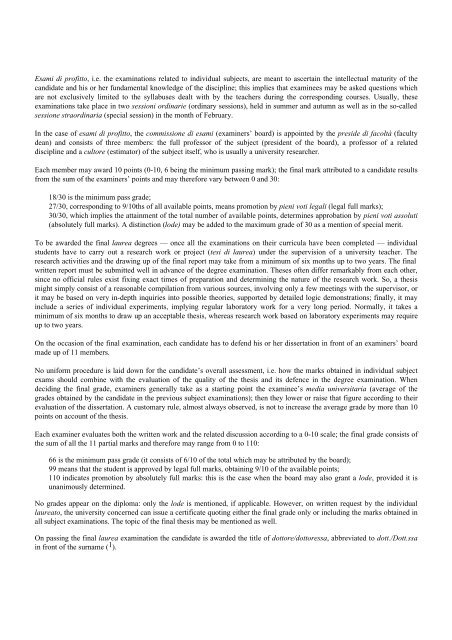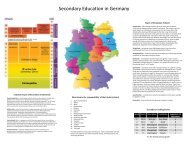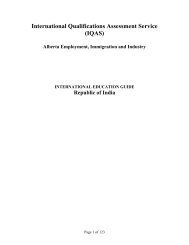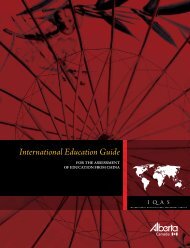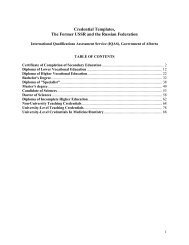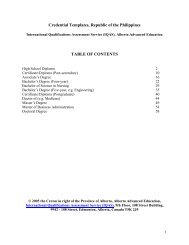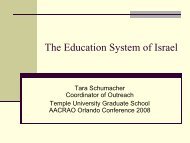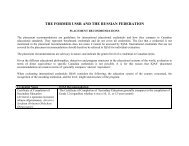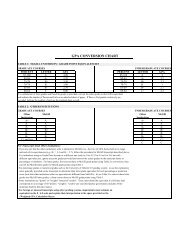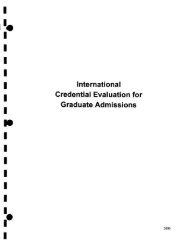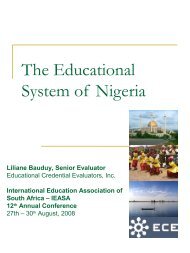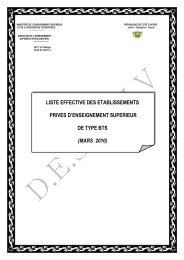NARIC guide on Higher Education Systems in the European Union
NARIC guide on Higher Education Systems in the European Union
NARIC guide on Higher Education Systems in the European Union
Create successful ePaper yourself
Turn your PDF publications into a flip-book with our unique Google optimized e-Paper software.
Esami di profitto, i.e. <strong>the</strong> exam<strong>in</strong>ati<strong>on</strong>s related to <strong>in</strong>dividual subjects, are meant to ascerta<strong>in</strong> <strong>the</strong> <strong>in</strong>tellectual maturity of <strong>the</strong><br />
candidate and his or her fundamental knowledge of <strong>the</strong> discipl<strong>in</strong>e; this implies that exam<strong>in</strong>ees may be asked questi<strong>on</strong>s which<br />
are not exclusively limited to <strong>the</strong> syllabuses dealt with by <strong>the</strong> teachers dur<strong>in</strong>g <strong>the</strong> corresp<strong>on</strong>d<strong>in</strong>g courses. Usually, <strong>the</strong>se<br />
exam<strong>in</strong>ati<strong>on</strong>s take place <strong>in</strong> two sessi<strong>on</strong>i ord<strong>in</strong>arie (ord<strong>in</strong>ary sessi<strong>on</strong>s), held <strong>in</strong> summer and autumn as well as <strong>in</strong> <strong>the</strong> so-called<br />
sessi<strong>on</strong>e straord<strong>in</strong>aria (special sessi<strong>on</strong>) <strong>in</strong> <strong>the</strong> m<strong>on</strong>th of February.<br />
In <strong>the</strong> case of esami di profitto, <strong>the</strong> commissi<strong>on</strong>e di esami (exam<strong>in</strong>ers’ board) is appo<strong>in</strong>ted by <strong>the</strong> preside di facoltà (faculty<br />
dean) and c<strong>on</strong>sists of three members: <strong>the</strong> full professor of <strong>the</strong> subject (president of <strong>the</strong> board), a professor of a related<br />
discipl<strong>in</strong>e and a cultore (estimator) of <strong>the</strong> subject itself, who is usually a university researcher.<br />
Each member may award 10 po<strong>in</strong>ts (0-10, 6 be<strong>in</strong>g <strong>the</strong> m<strong>in</strong>imum pass<strong>in</strong>g mark); <strong>the</strong> f<strong>in</strong>al mark attributed to a candidate results<br />
from <strong>the</strong> sum of <strong>the</strong> exam<strong>in</strong>ers’ po<strong>in</strong>ts and may <strong>the</strong>refore vary between 0 and 30:<br />
18/30 is <strong>the</strong> m<strong>in</strong>imum pass grade;<br />
27/30, corresp<strong>on</strong>d<strong>in</strong>g to 9/10ths of all available po<strong>in</strong>ts, means promoti<strong>on</strong> by pieni voti legali (legal full marks);<br />
30/30, which implies <strong>the</strong> atta<strong>in</strong>ment of <strong>the</strong> total number of available po<strong>in</strong>ts, determ<strong>in</strong>es approbati<strong>on</strong> by pieni voti assoluti<br />
(absolutely full marks). A dist<strong>in</strong>cti<strong>on</strong> (lode) may be added to <strong>the</strong> maximum grade of 30 as a menti<strong>on</strong> of special merit.<br />
To be awarded <strong>the</strong> f<strong>in</strong>al laurea degrees — <strong>on</strong>ce all <strong>the</strong> exam<strong>in</strong>ati<strong>on</strong>s <strong>on</strong> <strong>the</strong>ir curricula have been completed — <strong>in</strong>dividual<br />
students have to carry out a research work or project (tesi di laurea) under <strong>the</strong> supervisi<strong>on</strong> of a university teacher. The<br />
research activities and <strong>the</strong> draw<strong>in</strong>g up of <strong>the</strong> f<strong>in</strong>al report may take from a m<strong>in</strong>imum of six m<strong>on</strong>ths up to two years. The f<strong>in</strong>al<br />
written report must be submitted well <strong>in</strong> advance of <strong>the</strong> degree exam<strong>in</strong>ati<strong>on</strong>. Theses often differ remarkably from each o<strong>the</strong>r,<br />
s<strong>in</strong>ce no official rules exist fix<strong>in</strong>g exact times of preparati<strong>on</strong> and determ<strong>in</strong><strong>in</strong>g <strong>the</strong> nature of <strong>the</strong> research work. So, a <strong>the</strong>sis<br />
might simply c<strong>on</strong>sist of a reas<strong>on</strong>able compilati<strong>on</strong> from various sources, <strong>in</strong>volv<strong>in</strong>g <strong>on</strong>ly a few meet<strong>in</strong>gs with <strong>the</strong> supervisor, or<br />
it may be based <strong>on</strong> very <strong>in</strong>-depth <strong>in</strong>quiries <strong>in</strong>to possible <strong>the</strong>ories, supported by detailed logic dem<strong>on</strong>strati<strong>on</strong>s; f<strong>in</strong>ally, it may<br />
<strong>in</strong>clude a series of <strong>in</strong>dividual experiments, imply<strong>in</strong>g regular laboratory work for a very l<strong>on</strong>g period. Normally, it takes a<br />
m<strong>in</strong>imum of six m<strong>on</strong>ths to draw up an acceptable <strong>the</strong>sis, whereas research work based <strong>on</strong> laboratory experiments may require<br />
up to two years.<br />
On <strong>the</strong> occasi<strong>on</strong> of <strong>the</strong> f<strong>in</strong>al exam<strong>in</strong>ati<strong>on</strong>, each candidate has to defend his or her dissertati<strong>on</strong> <strong>in</strong> fr<strong>on</strong>t of an exam<strong>in</strong>ers’ board<br />
made up of 11 members.<br />
No uniform procedure is laid down for <strong>the</strong> candidate’s overall assessment, i.e. how <strong>the</strong> marks obta<strong>in</strong>ed <strong>in</strong> <strong>in</strong>dividual subject<br />
exams should comb<strong>in</strong>e with <strong>the</strong> evaluati<strong>on</strong> of <strong>the</strong> quality of <strong>the</strong> <strong>the</strong>sis and its defence <strong>in</strong> <strong>the</strong> degree exam<strong>in</strong>ati<strong>on</strong>. When<br />
decid<strong>in</strong>g <strong>the</strong> f<strong>in</strong>al grade, exam<strong>in</strong>ers generally take as a start<strong>in</strong>g po<strong>in</strong>t <strong>the</strong> exam<strong>in</strong>ee’s media universitaria (average of <strong>the</strong><br />
grades obta<strong>in</strong>ed by <strong>the</strong> candidate <strong>in</strong> <strong>the</strong> previous subject exam<strong>in</strong>ati<strong>on</strong>s); <strong>the</strong>n <strong>the</strong>y lower or raise that figure accord<strong>in</strong>g to <strong>the</strong>ir<br />
evaluati<strong>on</strong> of <strong>the</strong> dissertati<strong>on</strong>. A customary rule, almost always observed, is not to <strong>in</strong>crease <strong>the</strong> average grade by more than 10<br />
po<strong>in</strong>ts <strong>on</strong> account of <strong>the</strong> <strong>the</strong>sis.<br />
Each exam<strong>in</strong>er evaluates both <strong>the</strong> written work and <strong>the</strong> related discussi<strong>on</strong> accord<strong>in</strong>g to a 0-10 scale; <strong>the</strong> f<strong>in</strong>al grade c<strong>on</strong>sists of<br />
<strong>the</strong> sum of all <strong>the</strong> 11 partial marks and <strong>the</strong>refore may range from 0 to 110:<br />
66 is <strong>the</strong> m<strong>in</strong>imum pass grade (it c<strong>on</strong>sists of 6/10 of <strong>the</strong> total which may be attributed by <strong>the</strong> board);<br />
99 means that <strong>the</strong> student is approved by legal full marks, obta<strong>in</strong><strong>in</strong>g 9/10 of <strong>the</strong> available po<strong>in</strong>ts;<br />
110 <strong>in</strong>dicates promoti<strong>on</strong> by absolutely full marks: this is <strong>the</strong> case when <strong>the</strong> board may also grant a lode, provided it is<br />
unanimously determ<strong>in</strong>ed.<br />
No grades appear <strong>on</strong> <strong>the</strong> diploma: <strong>on</strong>ly <strong>the</strong> lode is menti<strong>on</strong>ed, if applicable. However, <strong>on</strong> written request by <strong>the</strong> <strong>in</strong>dividual<br />
laureato, <strong>the</strong> university c<strong>on</strong>cerned can issue a certificate quot<strong>in</strong>g ei<strong>the</strong>r <strong>the</strong> f<strong>in</strong>al grade <strong>on</strong>ly or <strong>in</strong>clud<strong>in</strong>g <strong>the</strong> marks obta<strong>in</strong>ed <strong>in</strong><br />
all subject exam<strong>in</strong>ati<strong>on</strong>s. The topic of <strong>the</strong> f<strong>in</strong>al <strong>the</strong>sis may be menti<strong>on</strong>ed as well.<br />
On pass<strong>in</strong>g <strong>the</strong> f<strong>in</strong>al laurea exam<strong>in</strong>ati<strong>on</strong> <strong>the</strong> candidate is awarded <strong>the</strong> title of dottore/dottoressa, abbreviated to dott./Dott.ssa<br />
<strong>in</strong> fr<strong>on</strong>t of <strong>the</strong> surname ( 1 ).


